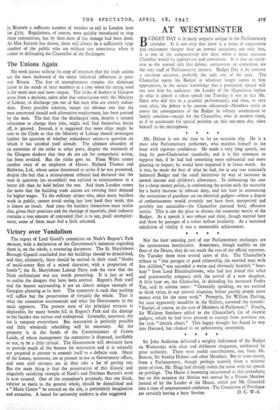The Unions Again
No week passes without its crop of instances that the trade unions are the most backward of the major industrial influences in post- war Britain. The fear of unemployment remains the dominant factor in the minds of their members at a time when the crying need is for more men and more output. The strike of dockers at Glasgow arose from a decision, taken after due consultation with the Ministry of Labour, to discharge soo out of Boo men who are clearly redun- dant. Every possible solution, except the obvious one that the men concerned should seek alternative employment, has been pressed by the men. The fact that the discharged men, despite a natural reluctance to change their jobs, might well find themselves better off, is ignored. _Instead, it is suggested that more ships might be sent to the Clyde or that the Ministry of Labour should investigate further the question of whether redundancy exists—a question on which it has satisfied itself already. The ultimate absurdity of an extension of the strike to other ports, despite the statement of the Glasgow dockers that they do not ask for sympathetic action, has been avoided. But the strike goes on. From Wales comes another story of an employee of Messrs. Richard Thomas and Baldwin, Ltd., whose union threatened to strike if he was promoted, despite the fact that a reinstatement tribunal had declared that the man in question (an ex-soldier) was entitled to reinstatement in a better job than he held before the war. And from London comes the news that the building trade unions are reviving their demand for higher wages. To the ordinary citizen who, since many builders work in public, cannot avoid seeing just how hard they work, this is almost an insult. And since the builders themselves must realise that, given their practices and the shortage of materials, their industry contains a vast amount of concealed (that is to say, paid) unemploy- ment, some of them must feel a little ashamed.


































 Previous page
Previous page